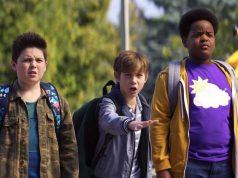Am I the only one who gets Genghis Khan confused with Attila the Hun? They’re both military leaders who conquered vast territories hundreds of years ago and are viewed as either brutal killers or heroic commanders, depending on who you ask. (Quick: Which one appears in “Bill & Ted’s Excellent Adventure”?) Thank goodness there are films like “Mongol” to set me straight. An Oscar nominee in the foreign-language category, the Kazakhstan-produced biopic is far more ambitious and cinematic than any previous treatment of the Mongol leader’s life, and it’s as slickly produced as any high-prestige Hollywood biography.
Also in the spirit of Hollywood: They want to make it a trilogy. “Mongol” covers only the early part of Genghis Khan’s life, in the late 1100s, before he assumed his now-legendary name. (“Khan” was a title, like “Caesar”; historians are divided on where “Genghis” came from.) Later chapters will presumably tell the rest of his story as a uniter of Mongol tribes and an unsurpassed conquerer of lands. I hope and pray that the next installment is called “Genghis II: The Wrath of Khan.”
We meet him as a 9-year-old boy named Temudjin (Odnyam Odsuren), the faithful son of a good father, Esugei (Ba Sen). A tribal leader himself, Esugei seeks to make an alliance with the Merkit group by betrothing young Temudjin to a Merkit girl, but on the way there Temudjin meets Borte (Bayertsetseg Erdenebat), a headstrong girl his age. They choose each other, and Esugei concedes to let them be engaged, even though he knows the Merkits will take it as an insult.
Soon thereafter, Esugei dies under suspicious circumstances, and a jealous tribesman named Targutai (Amadu Mamadakov) takes control. Mongol codes of honor prohibit him from killing someone as young as Temudjin, but the boy knows he’ll be a target as soon as he’s of age, so he flees for several years.
As an adult (and now played by Tadanobu Asano), Temudjin does marry Borte (Khulan Chuluun), and sure enough, the act does annoy the Merkits, who kidnap Borte out of spite. With Targutai still in his peripheral vision, and despite the fact that Mongols don’t normally go to war over a woman, Temudjin heads to Merkit territory to get his wife back. He is joined in his quest by his best friend Jamukha (Honglei Sun), who later becomes his rival.
See how epic and grand the whole thing is? Romance, betrayal, and warfare — lots and lots of blood-spraying warfare — are at the heart of the film, which was directed by veteran Russian filmmaker Sergei Bodrov and written by Bodrov and Arif Aliyev. The battle scenes, in particular, are thrilling and visceral without being too nauseating, and Japanese actor Tadanobu Asano’s performance as Temudjin has the stoicism and dedication you need for an effective biopic hero.
In fact, I’d say the film is better than most Hollywood biopics because it doesn’t assume we already know and love the person being depicted. Temudjin emerges as a three-dimensional figure with a real character arc. The film earns our attention and respect the way fictional movies do: by crafting a well-told, entertaining story. The fact that it happens to be true in its basic details is almost beside the point. And hey, maybe one of the sequels will include the part where he meets Bill and Ted.
B+ (2 hrs., 6 min.; Mongolian with subtitles; )





